SWEDISH
SOUTH ASIAN STUDIES NETWORK
Newsletter 76:
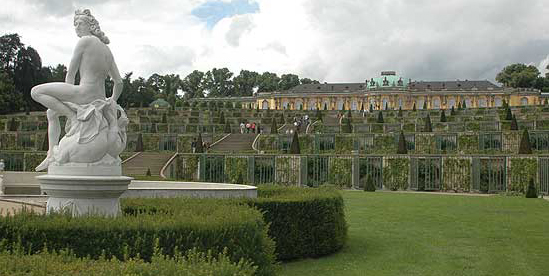 13
July 2007
13
July 2007
| Educational News |
| Conferences and workshops |
| South Asia related Culture |
| New and updated information |
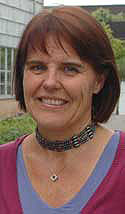 •
Open letter from the new SASNET Director
•
Open letter from the new SASNET Director
Since 1 July 2007, Anna Lindberg
is the new SASNET Director. Dr.
Lindberg, till recently Assistant Professor at Penn State University
in USA, has been appointed Director/Coordinator for SASNET on a 50 %
basis from 1 July 2007 to 31 December 2009. Besides working as Director
for SASNET, Anna Lindberg will also continue with an ongoing research
project on ”Marriage traditions in South India from 1930 to
the present”, being affiliated with Lund University’s Centre
for East and South-East Asian Studies (ACE). The historian Anna Lindberg
now succeeds Professor Staffan Lindberg, the driving force behind the
creation of the Swedish South Asian Studies Network in the year 2000
and its Director since the formal launch of SASNET in 2001. In an open
letter, Anna Lindberg declares her ambitions as Director for SASNET. Read
her statement.
• SASNET’s South Asian Reference
group meet in New Delhi
On Saturday 3 November 2007, a seminar meeting
will be organised in New Delhi for SASNET’s South Asian Reference
group, consisting of a number of senior researchers from the region,
that closely observe SASNET’s activities and give constructive
suggestions to the root node. SASNET’s new Director Anna Lindberg
and the Deputy Director Lars Eklund will then meet and discuss with
Dr. Rita Afsar, Bangladesh Institute of Development Studies, Dhaka,
Bangladesh; Professor Zulfiqar Bhutta, Dept. of Paediatrics, Aga Khan
University, Karachi, Pakistan; Dr. Tek Nath Dhakal, Campus Chief of
Public Administration Campus, Tribhuvan University, Kathmandu, Nepal;
Professor Kumudu Wijewardena, University of Sri Jayewardenepura (SJP),
Colombo, Sri Lanka; and Dr. Dipak Malik, Institute of Gandhian Studies, Varanasi, India. The meeting will be held at the
Nordic Centre in India (NCI) in Nizamuddin, New Delhi. More
information about SASNET’s South Asian Reference group.
• RUC/SASNET
joint Seminar on Post-Exotic India
 The Graduate School of International
Development Studies, Roskilde University Centre (RUC) organises a two-days
workshop titled ”Post-Exotic
India – a new Narrative in Making?” in collaboration
with SASNET on 26-27 September 2007 in Roskilde, Denmark. The seminar
is prepared by Dr. Ravinder Kaur and Prof. Laurids Lauridsen from RUC
and Prof. Staffan Lindberg, Lund University. The workshop aims to posit
and explore the post-exotic India through the following themes:
• processes and effects of 1991 economic liberalisation, • emergence
of a vocal, mobile and astute middle class, • global ambitions of
India, and • its regional implications in South Asia. Invited speakers
include Nicholas Dirks, Columbia University, USA; Pritam Singh, Oxford
University, UK; Thomas Blom Hansen, Amsterdam University, Netherlands;
and Srirupa Roy, Amherst, USA, SSRC New York (TBC). Venue: Roskilde Universiuty
Centre, Lille Auditorium. More information (as
a pdf-file)
The Graduate School of International
Development Studies, Roskilde University Centre (RUC) organises a two-days
workshop titled ”Post-Exotic
India – a new Narrative in Making?” in collaboration
with SASNET on 26-27 September 2007 in Roskilde, Denmark. The seminar
is prepared by Dr. Ravinder Kaur and Prof. Laurids Lauridsen from RUC
and Prof. Staffan Lindberg, Lund University. The workshop aims to posit
and explore the post-exotic India through the following themes:
• processes and effects of 1991 economic liberalisation, • emergence
of a vocal, mobile and astute middle class, • global ambitions of
India, and • its regional implications in South Asia. Invited speakers
include Nicholas Dirks, Columbia University, USA; Pritam Singh, Oxford
University, UK; Thomas Blom Hansen, Amsterdam University, Netherlands;
and Srirupa Roy, Amherst, USA, SSRC New York (TBC). Venue: Roskilde Universiuty
Centre, Lille Auditorium. More information (as
a pdf-file)
Besides being a workshop open to the public, it will
also be an Intensive PhD workshop. The programme is
the same with one exception, namely that the second day will
end up in a paper presentation seminar – open only to PhD
students upon application by July 15th to rkaur@ruc.dk.
A maximum of 20 PhD students can participate in the workshop
sessions. Each participant must prepare a short paper (no more
than five pages), presenting her/his research design and setting,
main questions regarding fieldwork and data collection techniques. More
information (as a pdf-file)
• More information about SASNET and its
activities
See SASNET’s page, http://www.sasnet.lu.se/sasnet.html
• Anthropological
working papers discussed through e-seminars
 The Media Anthropology
Network, established in 2004 by the European
Association of Social Anthropologists (EASA) has launched a working
papers series in order to create a space for discussion and reflection
on the anthropology of media.
The Network aims to foster the exchange of information and coordinate
research and teaching projects on the anthropological study of media.
It also hopes to contribute to the theoretical development of this
area of anthropological research. Besides posting working papers on
the website, a mailing list is used as an informal 'e-seminar' on them,
allowing the network to discuss papers over a period of a week after
their posting. Go
the Media Anthropology Network’ Working Papers web page.
The Media Anthropology
Network, established in 2004 by the European
Association of Social Anthropologists (EASA) has launched a working
papers series in order to create a space for discussion and reflection
on the anthropology of media.
The Network aims to foster the exchange of information and coordinate
research and teaching projects on the anthropological study of media.
It also hopes to contribute to the theoretical development of this
area of anthropological research. Besides posting working papers on
the website, a mailing list is used as an informal 'e-seminar' on them,
allowing the network to discuss papers over a period of a week after
their posting. Go
the Media Anthropology Network’ Working Papers web page.
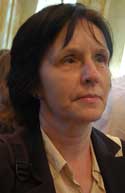 During
the period 12–26 June 2007, such an e-seminar was held
over a working paper presented by Kerstin Andersson, Dept.
of Social Anthropology, Göteborg University. Her paper,
titled ”The online Durga”, focusing on
the role of new ICT technologies in the creation, formation
and maintenance of a Diaspora identity among the Kolkata intellectuals,
was commented upon by Dr. Matthijs van den Bos, University
of Amsterdam and many others. Follow
the e-seminar on ”The online Durga”.
During
the period 12–26 June 2007, such an e-seminar was held
over a working paper presented by Kerstin Andersson, Dept.
of Social Anthropology, Göteborg University. Her paper,
titled ”The online Durga”, focusing on
the role of new ICT technologies in the creation, formation
and maintenance of a Diaspora identity among the Kolkata intellectuals,
was commented upon by Dr. Matthijs van den Bos, University
of Amsterdam and many others. Follow
the e-seminar on ”The online Durga”.
• Inaugural
Meeting of Asia-Europe Alumni Networks in Madrid
 An
Inaugural Meeting of Asia-Europe Alumni Networks will be held in Madrid,
Spain, 30 August – 1 September 2007. It will be
organised by the Asia-Europe Foundation (ASEF)
with the support of the Research Unit on International Security and
Cooperation (UNISCI) of the Universidad Complutense de Madrid and the
already existing ASEF University
Alumni Network (ASEFUAN). The Madrid meeting will be an informal
consultation process to derive ideas, reactions and substantive proposals
from specially invited high-level representatives of existing bi- or
international alumni networks, representing academic exchange programmes
with an Asia-Europe dimension. This brainstorming session will be organised
with workshops to facilitate an open and free discussion about the
formation of a platform for co-operation among various Asia-Europe
alumni networks. The meeting precedes the Sixth Annual Conference and
General Meeting of the ASEFUAN, also held in Madrid 2–7 September
2007. More
information about the ASEFUAN conference.
An
Inaugural Meeting of Asia-Europe Alumni Networks will be held in Madrid,
Spain, 30 August – 1 September 2007. It will be
organised by the Asia-Europe Foundation (ASEF)
with the support of the Research Unit on International Security and
Cooperation (UNISCI) of the Universidad Complutense de Madrid and the
already existing ASEF University
Alumni Network (ASEFUAN). The Madrid meeting will be an informal
consultation process to derive ideas, reactions and substantive proposals
from specially invited high-level representatives of existing bi- or
international alumni networks, representing academic exchange programmes
with an Asia-Europe dimension. This brainstorming session will be organised
with workshops to facilitate an open and free discussion about the
formation of a platform for co-operation among various Asia-Europe
alumni networks. The meeting precedes the Sixth Annual Conference and
General Meeting of the ASEFUAN, also held in Madrid 2–7 September
2007. More
information about the ASEFUAN conference.
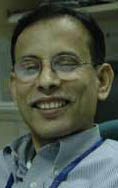 • Dissertation
about how rotavirus diarrhoea in children can be effectively treated
• Dissertation
about how rotavirus diarrhoea in children can be effectively treated
Dr.
Shafiqul Sarker from ICDDR,B (Centre for Health and Population Research)
in Dhaka, Bangladesh, defended his doctoral dissertation at Karolinska
Institutet Medical University, Stockholm, on
12 December 2006. The thesis is titled ”Passive immunotherapy
and probiotic agents in enteric infections in children”
and deals with diarrhoeal disease, one of the leading causes of
global childhood morbidity and mortality throughout the World.
Rotavirus and pathogenic Escherichia coli are the most common causes
of acute diarrheal illness in children. The thesis presents results
how the rotavirus diarrhoea in children can be effectively treated.
Dr. Sarker has been involved in a sandwich PhD programme with the Division
of of Clinical Immunology, Dept. of Laboratory Medicine at
Karolinska Institute since 2001, where he was supervised by Prof.
Lennart Hammarström. Read
the abstact of the thesis.
• Roots
of Democracy in the Himalayas theme for special issue of Sociological
Bulletin
Sociological Bulletin, the journal of the Indian Sociological
Society, plans for a special issue about ”CFP:
Routes and Roots of Democracy in the Himalayas” likely
to be published in early 2009. Contributions to this special issue
are now invited, and selected contributors will be asked to submit
full papers for anonymous peer-review by 30 January 2008. If interested,
please e-mail abstracts indicating title, giving author’s name
and institutional affiliation by 31 October 2007 to Prof. N.
Jayaram, Professor of Scoiology at Goa University, and Dr. Vibha
Arora, Assistant Professor in Sociology, Dept of Humanities and
Social Sciences, Indian Institute of Technology (IIT) Delhi. More
information about the Sociological Bulletin.
• ICAS
Book Prize
provides an international
focus for publications on Asia
The International Convention of Asia Scholars
(ICAS) Book Prize
– IBP – is a global competition which provides an international
focus for publications on Asia while at the same time increasing
their visibility worldwide. The book prizes are awarded for: (1) best
study in the humanities; (2) best study in the social sciences. Furthermore
there is a prize for the most outstanding PhD dissertation in the field
of Asia Studies. Eighty publications and 10 PhD theses were submitted
for the latest round (deadline 31 December 2006). They were presented
at the Association for Asian Studies (AAS) 2007 Meeting held in March
in Boston. The deadline for the coming IBP 2009 will be 31 December 2008. More
information about the ICAS Book Prize.
• Grim
scenario for South Asia according to IPCC Assessment Report
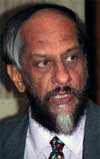 The Intergovernmental
Panel on Climate Change (IPCC) is currently finalizing its Fourth
Assessment Report "Climate Change 2007", also referred
to as AR4. A summary for policy makers was released by the
IPCC on 29 April 2007, which calls for urgent action globally.
IPCC,
chaired by Mr. Rajendra Pachauri (photo to the right),
was established by the World Meteorological
Organization (WMO) and the United
Nations Environment Programme (UNEP) in 1998 to assess scientific,
technical and socio- economic information relevant for the understanding
of climate change, its potential impacts and options for adaptation
and mitigation. The fuller final draft version of the Second
Working Group of the IPCC's Fourth Assessment Report, which may
be watered down before final publication, lays out shocking scenarios
for India and the rest of South Asia, including rising sea levels,
falling crop productivity and increased mortality due to heat-related
factors.
This scenario is described in detail by Daphne Wysham, Fellow
at the Institute for Policy Studies, Washington, and Smitu Kothari,
Director, Intercultural Resources, Delhi and Visiting Professor
at Princeton University, USA, in an article titled “Climate change will devastate India”,
published in the Hindu 9 April 2007. Read
the article.
The Intergovernmental
Panel on Climate Change (IPCC) is currently finalizing its Fourth
Assessment Report "Climate Change 2007", also referred
to as AR4. A summary for policy makers was released by the
IPCC on 29 April 2007, which calls for urgent action globally.
IPCC,
chaired by Mr. Rajendra Pachauri (photo to the right),
was established by the World Meteorological
Organization (WMO) and the United
Nations Environment Programme (UNEP) in 1998 to assess scientific,
technical and socio- economic information relevant for the understanding
of climate change, its potential impacts and options for adaptation
and mitigation. The fuller final draft version of the Second
Working Group of the IPCC's Fourth Assessment Report, which may
be watered down before final publication, lays out shocking scenarios
for India and the rest of South Asia, including rising sea levels,
falling crop productivity and increased mortality due to heat-related
factors.
This scenario is described in detail by Daphne Wysham, Fellow
at the Institute for Policy Studies, Washington, and Smitu Kothari,
Director, Intercultural Resources, Delhi and Visiting Professor
at Princeton University, USA, in an article titled “Climate change will devastate India”,
published in the Hindu 9 April 2007. Read
the article.
•
More than
half of the world’s population live in urban areas by 2008
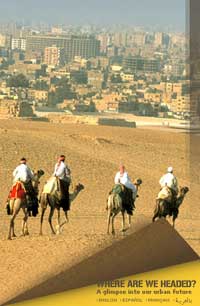 UNFPA,
the United Nations Population Fund, presented its 2007 State of World
Population Report on Wednesday 27 June 2007. UNFPA
is an international development agency that promotes the right of
every woman, man and child to enjoy a life of health and equal opportunity.
It has its headquarters in New York, USA. The theme for the 2007
report is ”Unleashing the Potential of Urban Growth”,
and deals with the fact that in 2008, for the first time, more than
half of the world’s population – 3.3 billion people – will
be living in urban areas. This unprecedented shift could enhance
development and promote sustainability – or it could deepen
poverty and accelerate environmental degradation. Full
information about the 2007 Report.
UNFPA,
the United Nations Population Fund, presented its 2007 State of World
Population Report on Wednesday 27 June 2007. UNFPA
is an international development agency that promotes the right of
every woman, man and child to enjoy a life of health and equal opportunity.
It has its headquarters in New York, USA. The theme for the 2007
report is ”Unleashing the Potential of Urban Growth”,
and deals with the fact that in 2008, for the first time, more than
half of the world’s population – 3.3 billion people – will
be living in urban areas. This unprecedented shift could enhance
development and promote sustainability – or it could deepen
poverty and accelerate environmental degradation. Full
information about the 2007 Report.
Coinciding with the World Population Day 2007 on July 11th, the World
Bank publishes material about ”South Asia Urban Growth – A
Challenge and an Opportunity”. It includes an interview with
the South Asia Chief Economist Shanta Devarajan, plus reports on Population
and Urban Development in Afghanistan, Bangladesh, India and Sri Lanka. Go
for the World Bank South Asia page.
• Finnish Government looks east – towards
India, China, Japan and South Korea
The Ministry of Education Government of Finland, has
also presented a strategy report regarding the Finnish government’s
ambitions regarding collaboration with som selected Asian countries (India,
China, Japan and South Korea) in the fields of education, research
and culture. The report titled
”Suuntana Aasia/Målet är Asien” was published
on 31 May 2007. Among the suggestions given are efforts to improve coordination
between different agencies in Finland and to better make use of existing
collaboration projects at Nordic and European levels, and also to increase
and develop exchange programmes within education and research. Positions
as Counsellor for research and culture are further suggested to be set
up at the embassies of Finland in both New Delhi and Beijing. The full
report is in Finnish, but a summary is available in Swedish. Read
the summary.
• More information about South Asia related
research at Swedish and Nordic universities
See SASNET’s page, http://www.sasnet.lu.se/research.html
• National
Knowledge Commission recommends educational reforms in India
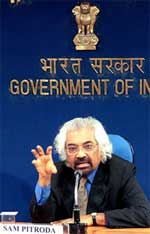 The Indian
National Knowledge Commission is a a high-level advisory body to
the Prime Minister of India,
with the objective of transforming India into a knowledge society
(more
information about the National Knowledge Commission). In an official
letter, dated 29 November 2006, its Chairman Sam Pitroda (photo
to the right) asks the Prime Minister to work for the establishment
of 50 National Universities all over India in order to provide education
of the highest standard. Pitroda also appeals for the creation of upto
1,500 new universities in the country, enabling India to attain a gross
enrolment ratio of at least 15 per cent by 2015. A change of the system
of regulation for higher education is also required, according to the
letter, and an increase in public spending and diversification of sources
of financing.
Reform of the existing universities and promotion of enhanced quality
are also pleaded for, and a thorough restructuring of the undergraduate
so-called affiliated colleges. Finally Pitroda lists the need for ensuring
access to university studies for all deserving students, and affirmative
action to ensure that access to education for economically and historically
socially underprivileged students is enhanced in a substantially more
effective manner. Read
the full letter with recommendations from the National Knowledge Commission (as
a pdf-file)
The Indian
National Knowledge Commission is a a high-level advisory body to
the Prime Minister of India,
with the objective of transforming India into a knowledge society
(more
information about the National Knowledge Commission). In an official
letter, dated 29 November 2006, its Chairman Sam Pitroda (photo
to the right) asks the Prime Minister to work for the establishment
of 50 National Universities all over India in order to provide education
of the highest standard. Pitroda also appeals for the creation of upto
1,500 new universities in the country, enabling India to attain a gross
enrolment ratio of at least 15 per cent by 2015. A change of the system
of regulation for higher education is also required, according to the
letter, and an increase in public spending and diversification of sources
of financing.
Reform of the existing universities and promotion of enhanced quality
are also pleaded for, and a thorough restructuring of the undergraduate
so-called affiliated colleges. Finally Pitroda lists the need for ensuring
access to university studies for all deserving students, and affirmative
action to ensure that access to education for economically and historically
socially underprivileged students is enhanced in a substantially more
effective manner. Read
the full letter with recommendations from the National Knowledge Commission (as
a pdf-file)
• More information about South
Asia related education at Swedish and Nordic universities
See SASNET’s page, http://www.sasnet.lu.se/education.html
• Tamil Nadu conference on Technology,
Innovation and the Millennium Development Goals
A three-day
International Conference on ”Technology,
Innovation and the Millennium Development Goals (MDG) in India” is
held in Tiruchirapalli, India, 12–14 July 2007. It is
jointly organised by the Bharathidasan
University and Institut National de
la Recherche Agronomique, Paris, France. The objective of the conference
is to explore technological solutions, organizational routines, social
norms and public policy to attain the MDG while facilitating exchange
between academics, NGOs, firms, funding agencies and policy makers.
It will be the first time in India that a conference is being specifically
organized to bring about a dialogue between mainstream academics, NGOs,
policy makers and private funding agencies on these issues. More
information (as a pdf-file)
• Eighth
World Hindi Conference inaugurated today
![]() The Eighth World Hindi Conference
is held in New York, USA, 13–15
July 2007. It is being organized in cooperation with Bharatiya
Vidya Bhavan, New York. The Conference will deliberate on issues relating
to the growth and presence of the Hindi language in the world including
teaching of Hindi in foreign countries, use of information technology
and necessary measures to increase its popularity. So far seven World
Hindi Conferences have been held at Nagpur (India), Port Louis (Mauritius,
twice), New Delhi (India), Port of Spain (Trinidad & Tobago), London
(UK) and Paramaribo (Surinam). This time the conference is being organized
in the Americas where a large number of Non Resident Indians (NRIs)
or People of Indian Origin (PIOs) are settled. The conference will
be inaugurated at the United Nations headquarters today, 13th July.
A large number of distinguished guests and senior dignitaries from
various countries are expected to attend the conference along with
eminent Hindi scholars, writers and poets from across the globe.
The Eighth World Hindi Conference
is held in New York, USA, 13–15
July 2007. It is being organized in cooperation with Bharatiya
Vidya Bhavan, New York. The Conference will deliberate on issues relating
to the growth and presence of the Hindi language in the world including
teaching of Hindi in foreign countries, use of information technology
and necessary measures to increase its popularity. So far seven World
Hindi Conferences have been held at Nagpur (India), Port Louis (Mauritius,
twice), New Delhi (India), Port of Spain (Trinidad & Tobago), London
(UK) and Paramaribo (Surinam). This time the conference is being organized
in the Americas where a large number of Non Resident Indians (NRIs)
or People of Indian Origin (PIOs) are settled. The conference will
be inaugurated at the United Nations headquarters today, 13th July.
A large number of distinguished guests and senior dignitaries from
various countries are expected to attend the conference along with
eminent Hindi scholars, writers and poets from across the globe.
• India/Pakistan Sixtieth Anniversary
discussed at Southampton conference
The Hartley Library in UK, which
houses the Mountbatten papers, in conjunction with the Centre for the
Study of Britain and its Empire at the University of Southampton holds a
conference entitled, 'The Independence
of India and Pakistan: Sixtieth Anniversary Reflections.' at the
Avenue Campus, University of Southampton on 17-20 July 2007. The event
will be divided into panel discussion and keynote plenary lectures.
Papers will be of 30 minutes duration followed by questions. The following
people have agreed to participate: Gyanendra Pandey, Urvashi
Butalia, Gurharpal Singh, Akbar S. Ahmed, Joya Chatterji, Victoria
Schofield, Sten Widmalm and Sikandar Hayat. More
information.
• Hyderabad Workshop on Demand
Side Management of Groundwater
An International Learning
Workshop on “Demand Side
Management of Groundwater” is held in Hyderabad, India, 23 July – 3
August 2007. It is organised by the Food and Agriculture Organization
of The United Nations (FAO) in collaboration with Bharathi Integrated
Rural Development Society (BIRDS) and the World Water Institute (WWI).
The Learning Workshop will comprise of thematic discussions, group
work, presentations, project work and field work. During the field
work sessions, participants will be able to interact with farmers,
farmers' groups and civil society institutions and experience different
processes being used to facilitate demand side management of groundwater.
The total number of participants will be 20 and from various countries. More
information (as a pdf-file).
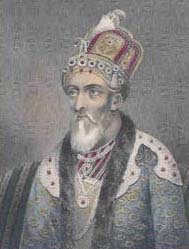 • Mutiny
at the Margins theme for Edinburgh conference
• Mutiny
at the Margins theme for Edinburgh conference
A conference titled ”‘Mutiny
at the Margins’.
New Perspectives on the Indian uprising of 1857” will be held
in Edinburgh, Scotland, 23–26 July 2007. The conference,
marking the 150th anniversary of the Indian Uprising will be organised
by the Centre for South Asian Studies at University of Edinburgh. The
ambition is to bring together British and Indian scholars with an interest
in developing new approaches and exploring new perspectives on this
seminal event. It is being organised as part of a wider programme of
research funded by the UK Arts & Humanities
Research Council (AHRC) at Edinburgh University in Scotland – one
of the premier centres for South Asian studies in the UK. The purpose
is to commemorate the 150th anniversary of this event, reinterpret
what happened, and to discuss its various legacies. More
information.
• 338
panels accepted for the ICAS 5 conference in Kuala Lumpur
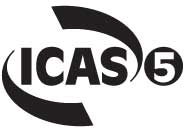 The Fifth International
Convention of Asia Scholars (ICAS 5) will be held in Kuala Lumpur,
Malaysa, 2–5
August 2007.
The theme for 2006 ICAS conference is 'Sharing a Future in Asia' ,
focusing on the fact that even though Asia is often proclaimed as the
fastest growing region in the world today, still nearly a billion of
its population live in poverty. The conference is organised by the
Institute of Occidental Studies (IKON), the Institute of The Malay
World and Civilization (ATMA), Universiti Kebangsaan Malaysia, and
the International Institute for Asian Studies (IIAS), University of
Leiden, the Netherlands. It will have 338 panels and more than 1500
participants. One of the keynote speakers is India born Prof. Arjun
Appadurai, Provost and Senior Vice President for Academic Affairs at
New School University in New York, USA. His most recent book is ”Modernity
at Large: Cultural Dimensions of Globalization” (1996, University
of Minnesota Press; 1997, Oxford University Press, Delhi). More
information about ICAS 5.
The Fifth International
Convention of Asia Scholars (ICAS 5) will be held in Kuala Lumpur,
Malaysa, 2–5
August 2007.
The theme for 2006 ICAS conference is 'Sharing a Future in Asia' ,
focusing on the fact that even though Asia is often proclaimed as the
fastest growing region in the world today, still nearly a billion of
its population live in poverty. The conference is organised by the
Institute of Occidental Studies (IKON), the Institute of The Malay
World and Civilization (ATMA), Universiti Kebangsaan Malaysia, and
the International Institute for Asian Studies (IIAS), University of
Leiden, the Netherlands. It will have 338 panels and more than 1500
participants. One of the keynote speakers is India born Prof. Arjun
Appadurai, Provost and Senior Vice President for Academic Affairs at
New School University in New York, USA. His most recent book is ”Modernity
at Large: Cultural Dimensions of Globalization” (1996, University
of Minnesota Press; 1997, Oxford University Press, Delhi). More
information about ICAS 5.
• 2007
World Water Week includes High Level Panel on Climate Change, Water
and Vulnerability
 The 2007 World Water Week will take place in in Stockholm
12–18
August.
The theme for the 2007 World Water Week will be "Progress
and Prospects on Water: Striving for Sustainability in a Changing World."
The World Water Week is the leading annual global meeting place for capacity-building,
partnership-building and follow-up on the implementation of international
processes and programmes in water and development, with large relevance
to South Asia. It is filled with plenary sessions, seminars, workshops,
side events and special activities. One of the key speakers is Ms. Sunita
Narain, Director for the Centre for Science and Environment (CSE), India.
Since the Fourth Assessment Report of the Intergovernmental Panel on
Climate Change (IPCC) was recently presented, the 2007 World Water Week
willl include a High Level Panel on Climate Change, Water and Vulnerability. Full
information about the World Water Week 2007.
The 2007 World Water Week will take place in in Stockholm
12–18
August.
The theme for the 2007 World Water Week will be "Progress
and Prospects on Water: Striving for Sustainability in a Changing World."
The World Water Week is the leading annual global meeting place for capacity-building,
partnership-building and follow-up on the implementation of international
processes and programmes in water and development, with large relevance
to South Asia. It is filled with plenary sessions, seminars, workshops,
side events and special activities. One of the key speakers is Ms. Sunita
Narain, Director for the Centre for Science and Environment (CSE), India.
Since the Fourth Assessment Report of the Intergovernmental Panel on
Climate Change (IPCC) was recently presented, the 2007 World Water Week
willl include a High Level Panel on Climate Change, Water and Vulnerability. Full
information about the World Water Week 2007.
• Asia-Europe
Colloquium on Governance & Management in Kuala Lumpur
 An
Asia-Europe Colloquium on Governance & Management will be held
in Kuala Lumpur, Malaysia, 5–6 September 2007.
It is organised by the Asia-Europe Foundation (ASEF).
The event addresses university leadership and representatives of university
associations and networks from all ASEM countries – since 2006
also including India and Pakistan. The event will be organised in partnership
with the European University Association (EUA), the Malaysian Vice
Chancellors Committee (MVCC) and will be hosted by the Malaysian Open
University. The colloquium aims to facilitate dialogue and discussion
on key issues of institutional management and governance, in order
to enhance exchange and cooperation prospects between Asian and European
Higher Education Institutions. More
information
An
Asia-Europe Colloquium on Governance & Management will be held
in Kuala Lumpur, Malaysia, 5–6 September 2007.
It is organised by the Asia-Europe Foundation (ASEF).
The event addresses university leadership and representatives of university
associations and networks from all ASEM countries – since 2006
also including India and Pakistan. The event will be organised in partnership
with the European University Association (EUA), the Malaysian Vice
Chancellors Committee (MVCC) and will be hosted by the Malaysian Open
University. The colloquium aims to facilitate dialogue and discussion
on key issues of institutional management and governance, in order
to enhance exchange and cooperation prospects between Asian and European
Higher Education Institutions. More
information
• 13th
International Association for Ladakh Studies Colloquium in Rome
 The
International Association for Ladakh Studies (IALS) organises its 13th
Colloquium in Rome, Italy, 7–11 September 2007.
Only in the last three decades has Ladakh (northwest India) been readily
accessible for study, but in that short time it has been the focus
of much attention by students in many disciplines. These have been
attracted by the interest of its physical situation at high altitude
in the rain-shadow of the geologically active Himalaya; by the natural
ecology of this rugged desert and the skilful adaptations of pastoralism
and agriculture; by the sociology, history and cultural tradition,
especially as a surviving example of Tibetan Buddhism; and by the problems
presented by modern development and conservation. The first international
Colloquium on Ladakh was organised at Konstanz (Germany) in 1981 and
eleven more have been organised by IALS since then in various European
countries and Ladakh. More
information
The
International Association for Ladakh Studies (IALS) organises its 13th
Colloquium in Rome, Italy, 7–11 September 2007.
Only in the last three decades has Ladakh (northwest India) been readily
accessible for study, but in that short time it has been the focus
of much attention by students in many disciplines. These have been
attracted by the interest of its physical situation at high altitude
in the rain-shadow of the geologically active Himalaya; by the natural
ecology of this rugged desert and the skilful adaptations of pastoralism
and agriculture; by the sociology, history and cultural tradition,
especially as a surviving example of Tibetan Buddhism; and by the problems
presented by modern development and conservation. The first international
Colloquium on Ladakh was organised at Konstanz (Germany) in 1981 and
eleven more have been organised by IALS since then in various European
countries and Ladakh. More
information
• London
conference on Indian Mass Media and the Politics
of Change
 A one-day conference about ”Indian Mass Media and
the Politics of Change” will be held for for Postgraduates & Early
Career Researchers at the School of Oriental and African Studies (SOAS)
in London, on Saturday 13 October 2007. It is jointly organized
by Sacredmediacow, an independent
student-led research centre on Indian media, and the Centre
for Film and Media Studies at SOAS. A significant portion of the
activities around the conference will take place on Sacredmediacow’s
website. The aim is to include the people talked about when researching
Indian media as much as possible in the dialogue and debates through
the possibilities allowed by new technologies: by distributing conference
material online, by creating an online platform where the questions
raised can be debated during the conference and by allowing distance
participation as much as possible through teleconferencing, video broadcast
and other such means. Venue: Khalili Lecture Theatre. More
information.
A one-day conference about ”Indian Mass Media and
the Politics of Change” will be held for for Postgraduates & Early
Career Researchers at the School of Oriental and African Studies (SOAS)
in London, on Saturday 13 October 2007. It is jointly organized
by Sacredmediacow, an independent
student-led research centre on Indian media, and the Centre
for Film and Media Studies at SOAS. A significant portion of the
activities around the conference will take place on Sacredmediacow’s
website. The aim is to include the people talked about when researching
Indian media as much as possible in the dialogue and debates through
the possibilities allowed by new technologies: by distributing conference
material online, by creating an online platform where the questions
raised can be debated during the conference and by allowing distance
participation as much as possible through teleconferencing, video broadcast
and other such means. Venue: Khalili Lecture Theatre. More
information.
• First International Sanskrit Computational
Linguistics Symposium in Paris
 The
First International Sanskrit Computational Linguistics Symposium will
be held in Paris, 29–31 October 2007. The Workshop will
have as main focus standardization issues concerning the inter-operability
of the various tools available for the computer processing of Sanskrit
texts. It is organised by the Rocquencourt Laboratory of INRIA (French
National Institute for Informatics and Automatics) in collaboration
with the Department
of Sanskrit Studies at University of Hyderabad, India, and the
NLP Department of the Rashtriya Sanskrit Vidyapeetha at Tirupati. Recently, the three institutions
have formed a joint team in Sanskrit Computational Linguistics, that
now will hold its first workshop. It has been decided to open the meeting
also to outside researchers. More
information.
The
First International Sanskrit Computational Linguistics Symposium will
be held in Paris, 29–31 October 2007. The Workshop will
have as main focus standardization issues concerning the inter-operability
of the various tools available for the computer processing of Sanskrit
texts. It is organised by the Rocquencourt Laboratory of INRIA (French
National Institute for Informatics and Automatics) in collaboration
with the Department
of Sanskrit Studies at University of Hyderabad, India, and the
NLP Department of the Rashtriya Sanskrit Vidyapeetha at Tirupati. Recently, the three institutions
have formed a joint team in Sanskrit Computational Linguistics, that
now will hold its first workshop. It has been decided to open the meeting
also to outside researchers. More
information.
• Stockholm conference on the War in
Afghanistan
An International
two-day conference on ”the War in Afghanistan. Local, Regional
and Global Aspects” will
be held in Stockholm, 8–9 November 2007. It is organised
by the Swedish Committee for Afghanistan (SCA), and will feature some
of the World’s leading authorities on the situation in Afghanistan
and the role of its neighbouring countries. In order to participate,
please send a mail to seminar@sak.se.
The invited speakers include Hanif Atmar, Minister of Education in
Afghanistan; Horia Mosadiq, Director of Human Rights Research and Advocacy
Consortium, Kabul; Research Director Svante Cornell, Silk Road Studies
Program, Uppsala University; Aziz Rafiee, Director of Afghanistan Civil
Society Forum, Kabul; and the well-renowned journalist/writer Ahmed
Rashid. Venue: Polstjärnan Konferens, Sveavägen 77, Stockholm. More
information (as a pdf-file)
• 3rd International Conference on Gross
National Happiness in Bangkok
 The
3rd International Conference on Gross National Happiness will be held in
Bangkok, Thailand, 22–28 November 2007. The
theme for the conference, co-organized by the Sathirakoses Nagapradipa
Foundation and the Center
for Bhutan Studies in Thimphu, will be ”Towards Global
Transformation – World Views make a Difference”.
The concept of Gross National Happiness (GNH), originated in Bhutan,
challenges development models dominated by GDP (Gross Domestic Product)
and un-sustainable economic growth. The Bangkok conference offers
a creative platform for exchanges, networking and policy development
towards transformation at individual, local, national and international
levels. It will be held in partnership with a network of Thai and
South East Asian NGO’s and youth groups; and the Ministry of
Social Development & Human Security, and ‘Well-being Index
Network’, Government of Thailand. Invited speakers include
Vandana Shiva from India, and Lyonpo Jigmi Thinley, President of
the Center for Bhutan Studies (CBS) and former Prime Minister of
Bhutan. More information.
The
3rd International Conference on Gross National Happiness will be held in
Bangkok, Thailand, 22–28 November 2007. The
theme for the conference, co-organized by the Sathirakoses Nagapradipa
Foundation and the Center
for Bhutan Studies in Thimphu, will be ”Towards Global
Transformation – World Views make a Difference”.
The concept of Gross National Happiness (GNH), originated in Bhutan,
challenges development models dominated by GDP (Gross Domestic Product)
and un-sustainable economic growth. The Bangkok conference offers
a creative platform for exchanges, networking and policy development
towards transformation at individual, local, national and international
levels. It will be held in partnership with a network of Thai and
South East Asian NGO’s and youth groups; and the Ministry of
Social Development & Human Security, and ‘Well-being Index
Network’, Government of Thailand. Invited speakers include
Vandana Shiva from India, and Lyonpo Jigmi Thinley, President of
the Center for Bhutan Studies (CBS) and former Prime Minister of
Bhutan. More information.
• Thiruvananthapuram conference on the
Kerala People’s Plan
An International Conference on ”Kerala
People’s
Plan Revisited” will be held in Thiruvananthapuram, India, 14–15
December 2007. It will be organized by Institute
of Social Sciences (ISS) in New Delhi, in co-operation with Kerala
Institute of Local Administration (KILA). The conference will focus
on the People’s Plan Campaign launched in mid-1990s in Kerala,
which was a historic landmark in formulating a methodology of decentralised
planning with people’s effective participation. The two-day conference
will pool and share the experience of local planning in Kerala, rest
of India and other countries. Papers are invited from social scientists,
planners, innovative NGOs and administrators. More
information.
• Guwahati
Conference on Northeast India and its Transnational Neighbourhood
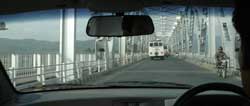 An
International Conference on Northeast India and its Transnational Neighbourhood
will be held in Guwahati, Assam, India, 16–18 January
2008.
The interdisciplinary conference will provide a forum for scholars
and policy makers, as well as visual artists and others involved in
the material and visual representation of this region. It is being
planned by the newly formed Asian Borderlands
Research Network (more
information). All scholars who are currently, or have previously
been actively involved in research in this region are invited to participate,
irrespective of nationality. However, it is hoped that scholars from
countries such as India, China, Bangladesh, Burma and Thailand will
make a significant contribution. The conference is organised by the Indian
Institute of Technology (IIT), Guwahati, in collaboration with
the Centre for Policy Research in New Delhi, and the International
Institute for Asian Studies (IIAS) in Leiden, the Netherlands. Venue:
IIT Campus, 20 km north of Guwahati. More
information.
An
International Conference on Northeast India and its Transnational Neighbourhood
will be held in Guwahati, Assam, India, 16–18 January
2008.
The interdisciplinary conference will provide a forum for scholars
and policy makers, as well as visual artists and others involved in
the material and visual representation of this region. It is being
planned by the newly formed Asian Borderlands
Research Network (more
information). All scholars who are currently, or have previously
been actively involved in research in this region are invited to participate,
irrespective of nationality. However, it is hoped that scholars from
countries such as India, China, Bangladesh, Burma and Thailand will
make a significant contribution. The conference is organised by the Indian
Institute of Technology (IIT), Guwahati, in collaboration with
the Centre for Policy Research in New Delhi, and the International
Institute for Asian Studies (IIAS) in Leiden, the Netherlands. Venue:
IIT Campus, 20 km north of Guwahati. More
information.
• Ahmedabad Seminar on Vernacular Settlements
The
Fourth International Seminar on Vernacular Settlements will be held
in Ahmedabad, India, 14–17
February 2008.
It will be hosted by the School of Architecture at CEPT
University (Centre for Environmental Planning and Technology) in
Navrangpura, Ahmedabad. The theme of the seminar is "Vernacular
Settlements and Architecture in Transition". Keynote Speakers
will be Prof. Balkrishna Doshi, a Fellow of the Royal Institute of
British Architects and a Fellow of the Indian Institute of Architects;
and Dr Hasan-Uddin Khan, Professor of Architecture and Historic Preservation
at Roger Williams University and Visiting Professor of Architecture
at the Massachusetts Institute of Technology, USA.
• South
Asia related panels at the
16th IUAES conference in Kunming
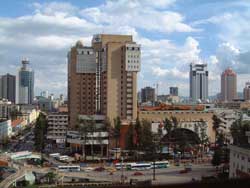 The 16th International
Union of Anthropological and Ethnological Sciences (IUAES) will be
held 15–23 July 2008
in Kunming, Yunnan, China. The
conference has the overall theme ”Humanity, Development and
Cultural Diversity” and includes a large number of panels
organised by researchers from India and Bangladesh. Full
information about the IUAES conference.
The 16th International
Union of Anthropological and Ethnological Sciences (IUAES) will be
held 15–23 July 2008
in Kunming, Yunnan, China. The
conference has the overall theme ”Humanity, Development and
Cultural Diversity” and includes a large number of panels
organised by researchers from India and Bangladesh. Full
information about the IUAES conference.
– A panel entitled
”Diverse Ethnic Rites of Passage” is
organised by Associate Professor Zulfiquar Ali Islam, Dept. of Sociology,
University of Rajshahi, Bangladesh, and Associate Professor Md Mustafa
Kamal Akand from the Dept. of Anthropology at the same university. Read
their call for papers (as a pdf-file)
– Dr. Zulfiquar Ali Islam also convenes a second panel (together with
Prof. A H M Zehadul Karim, Dept. of Anthropology, University of Rajshahi),
titled ”Indigenous Knowledge for Ecological
Resource Management”. Read their
call for papers (as a pdf-file)
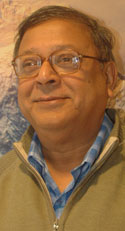 – A
panel entitled ”Pilgrimage Landscape,
Cosmogram and Planning the Heritage Cities” is
organised by Prof. Rana P. B. Singh (photo to the left),
Banaras Hindu University, India and Prof. Masaaki Fukunaga, Centre
for South Asian Studies, Gifu Women’s University, Japan. Read
their call for papers (as a pdf-file)
– A
panel entitled ”Pilgrimage Landscape,
Cosmogram and Planning the Heritage Cities” is
organised by Prof. Rana P. B. Singh (photo to the left),
Banaras Hindu University, India and Prof. Masaaki Fukunaga, Centre
for South Asian Studies, Gifu Women’s University, Japan. Read
their call for papers (as a pdf-file)
– A panel on ”Ethnographic Discourse of
the Other in the 21st Century Asia’” vill be organised
by Senior Research Fellows Eswarappa Kasi from the Dept. of Anthropology, and
Ramesh C: Malik from the Centre for Applied Linguistics and Translation Studies
(CALTS), bott at University of Hyderabad. Read
their call for papers (as a pdf-file)
– Other South Asia related panels at the Kunming conference include a
panel on ”Himalaya: Ecology, Adaptability and
Culture”, organised by Prof. Ajai Pratap Singh, Commission
on Anthropology of Small Islands; a panel on ”Anthropology
of Water”, organised by S. Narayan, A.N. Sinha Institute
of Social Studies in Patna; and a panel on ”Female
Child Migration and Trafficking in Asia”, organised by Vijay
Prakash Sharma, Advisor of USAID/India
– REFORM Project.
• Other conferences connected to South Asian
studies arranged all over the World
See SASNET’s page, http://www.sasnet.lu.se/conferences.html#conf
South Asia related culture in Scandinavia
• Information about South Asia related culture
in Scandinavia
See SASNET’s page, http://www.sasnet.lu.se/culture.html
New and updated items on SASNET web site
• Swedish departments where research on
South Asia is going on:
Constantly added to the list of research environments at Swedish
universities, presented by SASNET. The full list now includes 214 departments,
with detailed descriptions of the South Asia related research and education
taking place! Go to http://www.sasnet.lu.se/environment.html
ƒ Dept. of Systems and Software Engineering (APS), School of Engineering, Blekinge Institute of Technology, Karlskrona/Ronneby
ƒ Dept. of Electroscience, Faculty of Engineering, Lund University
ƒ Dept. of Zoology, Stockholm University
• Several new articles recommended for reading
Look at http://www.sasnet.lu.se/recreading.html for
suggestions on interesting new articles on South Asia in International media,
and new books published at http://www.sasnet.lu.se/newbooks.html.
• Useful travelling information
Look at http://www.sasnet.lu.se/travelling.html.
Updated travel advises from the The British Foreign & Commonwealth
Office about safety aspects on travelling to the countries of
South Asia.
Best regards,
Anna Lindberg Lars Eklund
SASNET/ Swedish South Asian Studies Network
SASNET is a national network
for research, education, and information about South Asia, based at Lund
University. The aim is to encourage and promote an open and dynamic networking
process, in which Swedish researchers co-operate with researchers in South
Asia and globally.
The network is open to all sciences. Priority is given to co-operation
between disciplines and across faculties, as well as institutions in the
Nordic countries and in South Asia. The basic idea is that South Asian
studies will be most fruitfully pursued in co-operation between researchers,
working in different institutions with a solid base in their mother disciplines.
The network is financed by Sida (Swedish
International Development Cooperation Agency) and by Lund
University.
Postal address: SASNET – Swedish South Asian Studies Network,
Scheelevägen 15 D, SE-223 70 Lund, Sweden
Visiting address: Ideon Research Park, House Alfa 1 (first floor,
room no. 2040 & 2041), in the premises of the Centre for East and South
East Asian Studies at Lund University (ACE).
Phone: + 46 46 222 73 40
Fax: + 46 46 222 30 41
E-mail: sasnet@sasnet.lu.se
Web site:
http://www.sasnet.lu.se
Staff: Anna
Lindberg, director/coordinator & Lars
Eklund, webmaster/deputy director
SASNET - Swedish South Asian Studies Network/Lund
University
Address: Scheelevägen 15 D, SE-223 70 Lund, Sweden
Phone: +46 46 222 73 40
Webmaster: Lars Eklund
Last updated
2010-02-17
